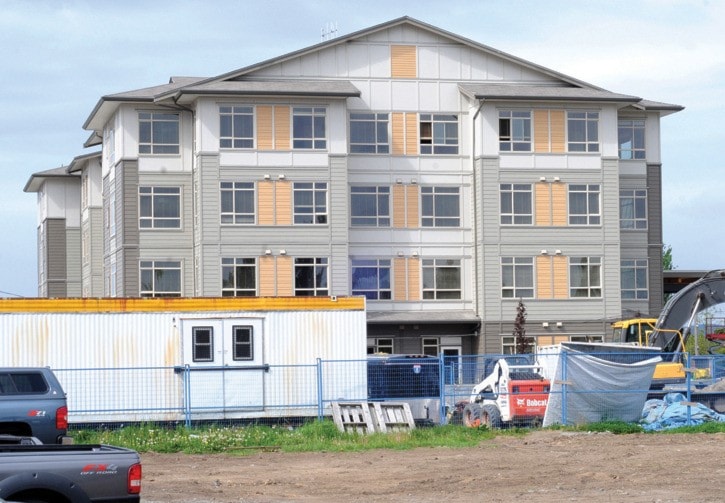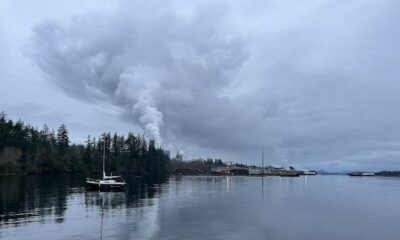Business
Oak Bay Residents Debate Future of Low-Rise Apartment Development

Residents of Oak Bay, a municipality in British Columbia, are voicing concerns over the potential construction of three-storey apartment and condominium buildings in their predominantly residential neighbourhoods. The proposal has sparked a vigorous debate among locals, particularly those apprehensive about the implications of urban densification.
Critics of the proposed development argue that it could disrupt the character of the community. Some residents express fears that introducing low-rise apartments could lead to increased traffic and changes in the neighbourhood’s ambiance. However, supporters assert that low-rise buildings, typically defined as structures with three or fewer storeys, can foster community ties while maintaining the area’s tree canopy and promoting walkability.
Advocates for low-rise apartments highlight studies indicating that such developments can encourage neighbourly interactions. They argue that these structures represent a gentler solution to the pressing housing crisis facing many urban areas. As cities grapple with rising populations and housing demands, proponents believe that integrating low-rise apartments into residential districts could prevent the emergence of larger, high-density buildings.
The ongoing debate reflects a broader trend in North America, where many communities still cling to traditional suburban ideals. Critics label this preference as elitist, unsustainable, and a remnant of a bygone era. They contend that if municipalities such as Oak Bay resist low-rise developments, they risk inadvertently paving the way for taller, less desirable high-rise condominiums. These structures often feature smaller units that cater more to investment interests than to the needs of families and individuals seeking homes.
Drawing parallels to Vancouver, one resident, C. Brandt, emphasized the impact of single-family lot homeowners resisting densification. This resistance has led to the approval of large condominium towers in an attempt to meet housing targets, creating living spaces that many deem unsuitable. Brandt noted that Vancouver is now facing significant challenges as it attempts to rectify its housing policies.
To avoid similar pitfalls, Brandt advocates for the integration of low-rise apartment complexes within residential streets in Oak Bay. By doing so, the community could accommodate young families and working professionals seeking a balance between space and connection to their neighbourhood.
Brandt referenced Kerrisdale, a neighbourhood in Vancouver that successfully navigated similar changes from the 1960s to the 1980s. He argued that, with careful planning, Oak Bay could replicate this model, ensuring that new developments enhance rather than detract from the community’s character.
As the conversation around housing in Oak Bay continues, it raises essential questions about the future of urban living. With increasing demands for housing, local governments must balance the desires of long-term residents with the need for growth and accessibility. The outcome of this debate may significantly influence the community’s landscape in the years to come, particularly as more individuals and families seek affordable housing options.
Ultimately, the discourse surrounding low-rise apartments in Oak Bay is emblematic of a larger struggle within urban planning. The challenge lies in finding a path that accommodates new residents while preserving the essence of established communities. As this dialogue unfolds, it will be crucial for Oak Bay to consider innovative housing solutions that align with the needs of its growing population.
-

 Politics4 weeks ago
Politics4 weeks agoSecwepemc First Nation Seeks Aboriginal Title Over Kamloops Area
-

 World5 months ago
World5 months agoScientists Unearth Ancient Antarctic Ice to Unlock Climate Secrets
-

 Entertainment5 months ago
Entertainment5 months agoTrump and McCormick to Announce $70 Billion Energy Investments
-

 Science5 months ago
Science5 months agoFour Astronauts Return to Earth After International Space Station Mission
-

 Lifestyle5 months ago
Lifestyle5 months agoTransLink Launches Food Truck Program to Boost Revenue in Vancouver
-

 Technology3 months ago
Technology3 months agoApple Notes Enhances Functionality with Markdown Support in macOS 26
-

 Lifestyle3 months ago
Lifestyle3 months agoManitoba’s Burger Champion Shines Again Amid Dining Innovations
-

 Top Stories2 months ago
Top Stories2 months agoUrgent Update: Fatal Crash on Highway 99 Claims Life of Pitt Meadows Man
-

 Politics4 months ago
Politics4 months agoUkrainian Tennis Star Elina Svitolina Faces Death Threats Online
-

 Sports5 months ago
Sports5 months agoSearch Underway for Missing Hunter Amid Hokkaido Bear Emergency
-

 Politics5 months ago
Politics5 months agoCarney Engages First Nations Leaders at Development Law Summit
-

 Technology5 months ago
Technology5 months agoFrosthaven Launches Early Access on July 31, 2025




















